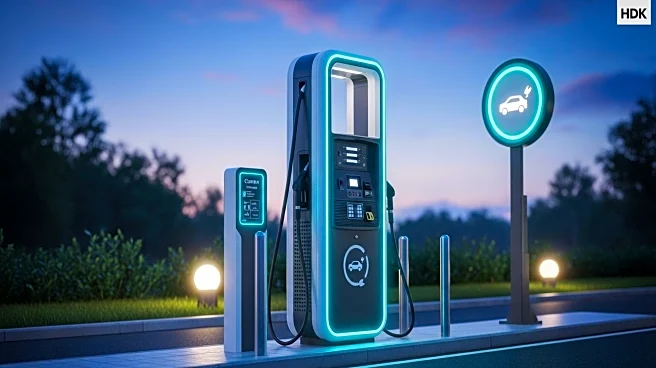What's Happening?
Electric vehicles (EVs) offer a potential cost-saving advantage over traditional gasoline-powered cars, primarily through cheaper charging costs. According to a detailed analysis, the average monthly cost of charging an EV in the U.S. is approximately $73, compared to $159 for fueling a gasoline car. This calculation is based on driving 1,250 miles per month, using average U.S. electricity and gasoline prices. The cost of electricity varies significantly across states, with Hawaii and California having higher rates than the national average. Charging at home during off-peak hours is generally the most economical option, while public charging stations can be more expensive. The type of EV and its power efficiency also influence cost savings, with models like the Tesla Model 3 and Ford F-150 Lightning differing in efficiency.
Why It's Important?
The shift towards electric vehicles is significant for both economic and environmental reasons. Lower operating costs for EVs can make them more attractive to consumers, potentially accelerating the transition from gasoline-powered vehicles. This shift could reduce dependency on fossil fuels, decrease greenhouse gas emissions, and contribute to climate change mitigation efforts. Additionally, the economic impact includes potential savings for consumers, which could be reinvested into other sectors, stimulating economic growth. However, the upfront costs of EVs and home charging installations remain a barrier for some consumers, highlighting the need for incentives and infrastructure development.
What's Next?
As the EV market continues to grow, further developments in charging infrastructure and technology are expected. This includes more widespread availability of public charging stations and advancements in battery technology to increase efficiency and reduce costs. Policymakers may introduce additional incentives to encourage EV adoption, such as tax credits or rebates for home charging installations. The automotive industry is likely to continue innovating, with new models offering improved range and efficiency. Consumer education on the benefits and costs of EV ownership will be crucial in driving adoption.
Beyond the Headlines
The transition to electric vehicles also raises questions about energy grid capacity and the environmental impact of battery production and disposal. As more consumers switch to EVs, the demand for electricity will increase, necessitating upgrades to the grid and potentially leading to higher electricity prices. The production and disposal of EV batteries pose environmental challenges, requiring sustainable practices and recycling solutions. These factors must be addressed to ensure the long-term viability and sustainability of the EV market.








